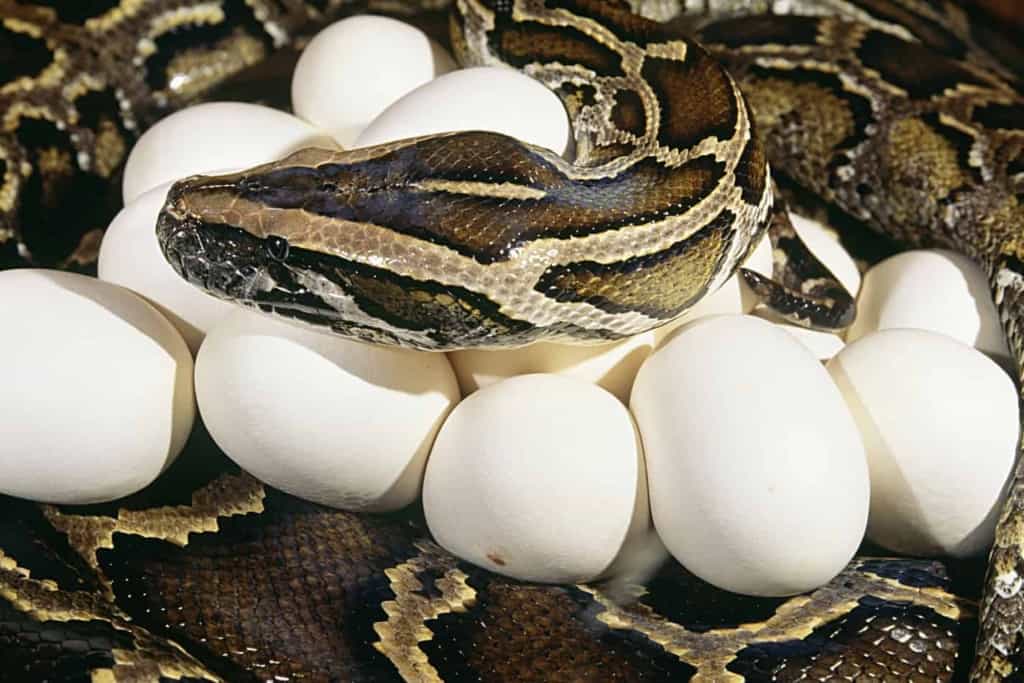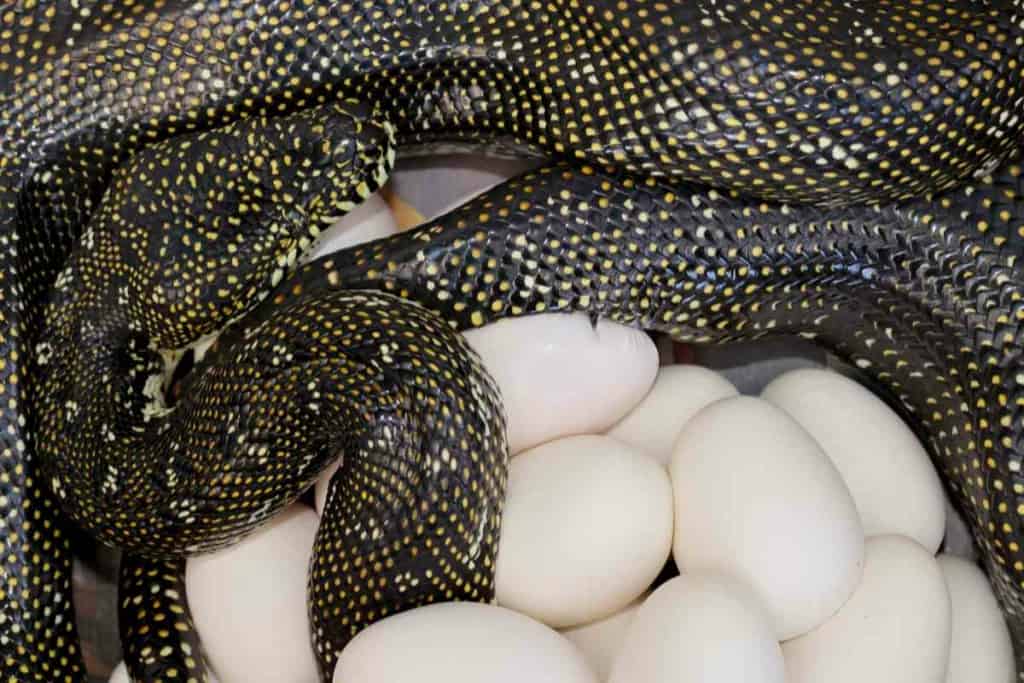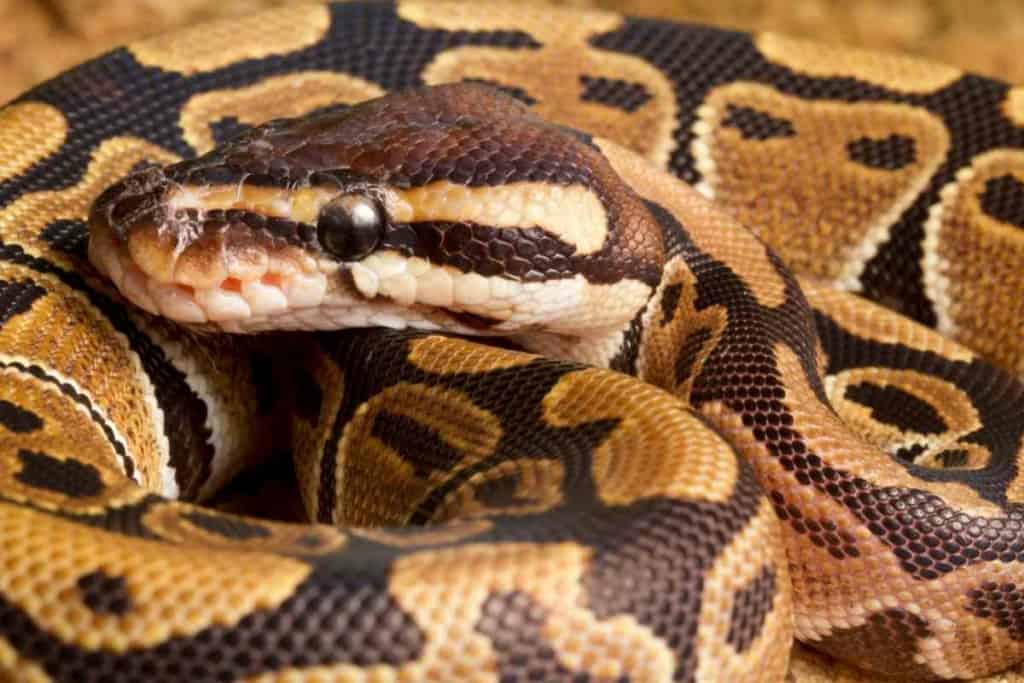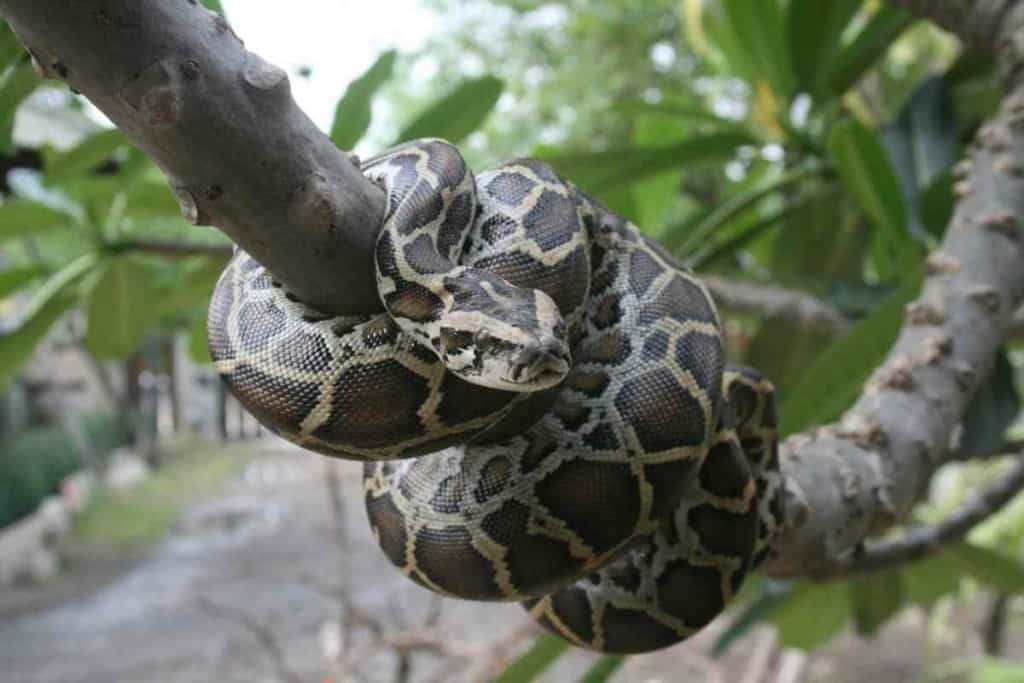How Often Do Pythons Lay Eggs?
Some snakes give live birth to their young, while others lay eggs and incubate them for a few weeks until they’re ready for a life of slithering around their enclosure looking all cute and awesome.

How often do pythons lay eggs?
It depends on the type of python, but on average, pythons lay eggs once per year and lay anywhere from 20-100 eggs. This depends on size and species.
Burmese pythons lay eggs once per “season,” or year, and can lay as many as a hundred eggs. Female Ball pythons lay about six ball python eggs. Reticulated pythons can lay anywhere from 20-100 eggs. Below, I’ve included a more specific chart for several python types.
| Type of Python | Ball python | Borneo python | Burmese python | Angolian python | Reticulated Python | African Rock Python |
| Egg-laying Season | Year-round | Every other year | March-May | March-July | March-July | March-August |
| Amount of eggs on average | 6 | 12-30 | 20-100 | 6 | 60-80 | 20-50 |
Excepting the Borneo python, these female ball pythons and all other pythons only lay eggs once per year.
Which Python Lays the Most Eggs?
Pythons lay eggs once per season with the exception of the Borneo python, which only lays eggs every other year. Some pythons lay more than others. I wondered which one lays the most and I have summed it up for you here.
Which python lays the most eggs? Burmese pythons seem to lay the most eggs on average. They can lay anywhere from 20-100 eggs per clutch, depending on their size and health conditions and possibly their age.
The bigger the python, the more eggs they have the capacity to lay. This goes for any of the python species.
Their health also plays an important role, as snakes that are not well-fed may lay as many eggs, but the eggs have a lower chance of making it to hatchlings. If the snake is sick or older, they will not lay as many eggs.
And, while it’s true that female pythons can lay fertile or infertile eggs if they have not been mating with a male, it’s still possible for your female python to exhibit asexual reproduction, producing fertile, good eggs all on her own, without the presence of sperm. While this isn’t exactly normal, it’s not that rare either.
Taking into account the age a python lives to can help us understand about how many eggs the snake can lay in its lifetime. Remember that it takes a couple years for snakes to be ready to breed, and the older they get the less they will.
| Related Article! |
| How To Breed A Female Ball Python |
How Long Does a Python Live For?

Smaller snakes tend to have shorter life spans, but the big ones live a pretty good stretch of years.
How long does a python live for in captivity? It depends on the species. Here are some averages:
| Type of Snake | Ball Python | Borneo Python | Burmese python | Angolian python | Reticulated python | African Black Rock python |
| Average Life Span in Years | 30 | 20 | 20-25 | 25+ | 15-20 | 30 |
Once again, a million factors could play into the age your python will reach. If your snake is fed a fully organic diet and gets enough sleep at night on a memory foam mattress, practices yoga, exercises daily, uses essential oils, and watches Oprah, she’ll probably live forever.
Really, though. Diet and lots of other things go into the length of your pet snake’s life.
When it comes down to it, twenty years is the average, and you get to have your cozy Slytherin companion with you for that long. Enjoy it.
How Do Female Pythons Incubate Her Own Eggs?
Mothers are protective, even scaly, long and scary ones. When a snake lays her clutch of eggs, she’ll do everything she can to make sure they make it and are safe from predators
So how does a mother python incubate her eggs? A mother python will wrap around her eggs and cause little twitching vibrations within her body through her coils on top of the substrate, which produces heat and warms her eggs.
Some pythons take longer to hatch than others, but in general you can expect your maternal little snake pet to be wrapped and coiled around her eggs for 50-70 days, which is how long python eggs take to hatch.
Artificial incubation shouldn’t be to far off time-wise from these days.
If you are planning on having cute little snaky hatchlings to watch over, and you’re wondering if it’s safer to incubate them yourself, feel free to read on.
Is it Safe to Artificially Incubate Python Eggs?
So your little mother python finally laid her eggs.
First things first, you better decide if you’re gonna incubate these little snake cuties yourself, or if you’re gonna let the mother hug them for a few months inside the cage instead. But which is safer?
Is it safe to “artificially” incubate the eggs? Yes, it is. It is done successfully all the time.
In the same breath, I can say that it’s just as safe or safer to let the fertile eggs be maternally incubated.
Pythons have been laying eggs for… well, longer than you and I have been alive for. I’m pretty sure they’ll be able to hatch their own babies just fine if you’ve provided them the right habitat and nest.
Some people decide to incubate the eggs themselves, while others prefer for it to go through naturally and just let the mother snakes handle everything. Either way is completely fine.

If you are considering incubating the baby snake eggs, here are some quick tips:
- Have the incubator ready before the eggs are laid. I’m not talking chicken egg incubators (that’s not really a viable option for a completely different species). You can buy the snake incubator or build one yourself, but whatever you do, don’t treat your snakes like little chickens.
- Have a thermostat ready. Some incubators have these already, but you could be extra-safe and make sure the temperatures are perfect on a regular basis. The temperatures you’ll be shooting for are 88-90 degrees Fahrenheit. You want those little snakes nice and toasty.
- Make sure you have a way to check humidity. These little buggers need around 90% humidity during incubation.
- They might be kinda sticky, so be prepared. When you do move the eggs to the incubator, be prepared for them to be sticking together. You don’t want to move around the egg’s position. Make sure it is laying in the same way and degree it was laid by its mommy, or it might get shaken up.
- Be prepared for adorable little pythons. These guys pop out of their eggs in 4-5 weeks, so unless you’re letting the mommy python take care of them, be prepared to be at these little eggs’ beck and call until your little snake friends say hello to their new world.
Just remember that babies of virtually every species are super dang adorable, and snakes are no exception. They’ll look like pink little versions of your own snake. Cute, right?
[hurrytimer id=”11278″]Related Questions
How big are python eggs?
On average, the eggs will be about 3 inches long.
This varies quite a bit depending on the number of eggs laid and the size of the mother python. The more eggs, the smaller they will be.
How big are python hatchlings?
On average they are 10 inches long when they hatch.
Even for shorter types of pythons, such as Borneo or “blood” pythons, which only grow to about four feet, they are 10-15 inches at birth.
Why do python eggs collapse?
If it looks like your eggs might be deflating, collapsing, or even getting bulgy, it’s due to humidity levels.
For example, if you opted not to separate eggs, ones on top of the pile may start to collapse because they are not humid enough. Eggs that are on the bottom might soak up more moisture and look bulgy.
What can be done when python eggs are “collapsing”?
If your top eggs look a little collapsed, one trick is to dampen toilet paper and wrap it around those eggs.
This will help raise the humidity levels. The further along the eggs are, the more you won’t want to shake the babies up. Be careful.
Related Articles Just For You!
If you found this article about pythons helpful, I suggest checking out one of these other articles.
Summary
This article provides information about the breeding, egg-laying, and incubation of python eggs. The following are the main points of the article:
- Pythons lay eggs once per year, except for the Borneo python, which lays every other year, and Burmese pythons tend to lay the most eggs, ranging from 20-100 eggs per clutch.
- The number of eggs laid depends on the species, the size, the health of the python, and its age.
- The average lifespan of pythons is 15-30 years, with the bigger ones having a longer lifespan than the smaller ones.
- A mother python incubates her eggs by wrapping around them, producing heat from her body’s vibrations for about 50-70 days.
- Artificial incubation of the eggs is safe and successful, but maternally incubated eggs are just as safe or even safer, depending on the situation.



